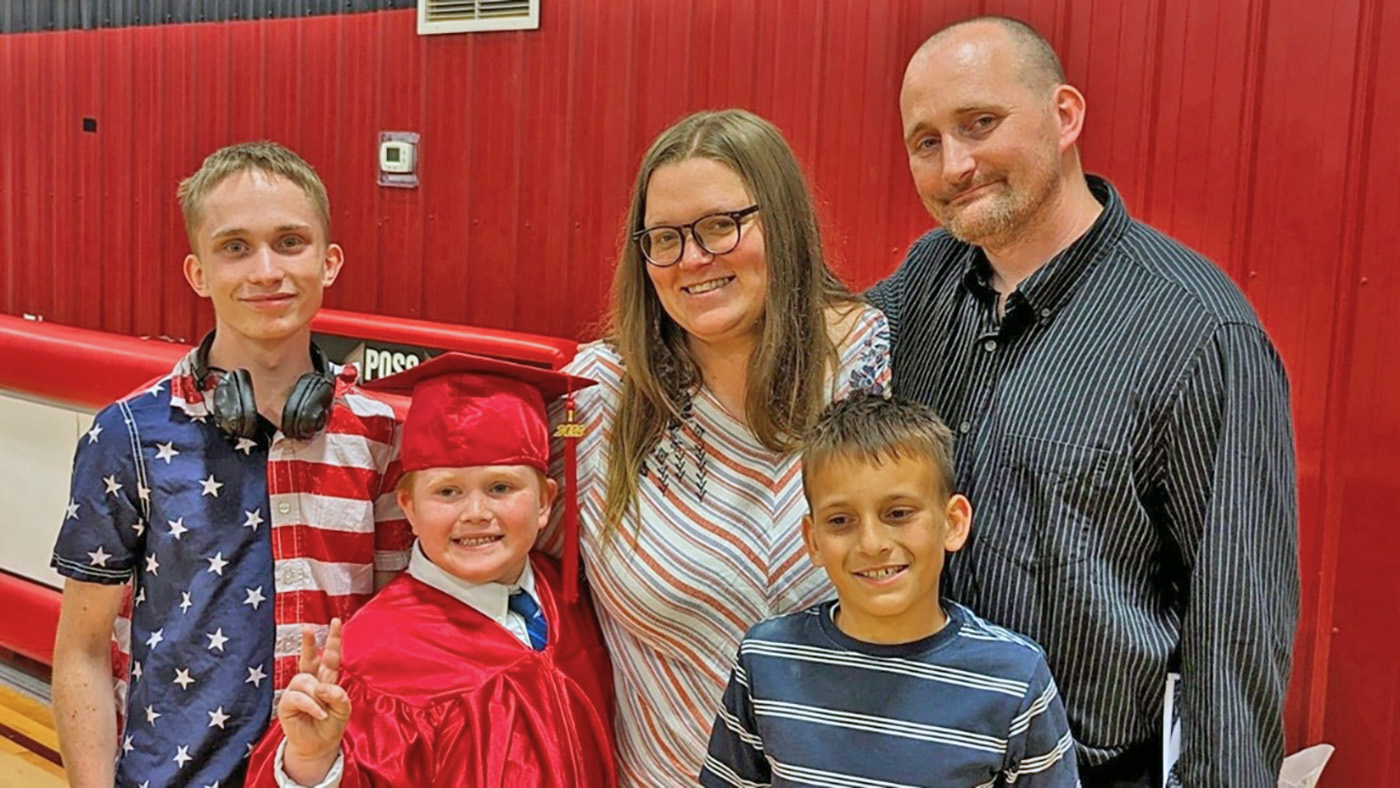Shelena Drollinger shares her story of finding support through VA’s Veteran Community Partnership (VCP) program and her community to care for her husband who experienced trauma during his deployment to Afghanistan. The VCP program connects VA with community providers and organizations, ensuring support to meet the diverse needs of all Veterans. The National Center for Healthcare Advancement and Partnerships (HAP) works with the VCP initiative to create a system of support for Veterans, families and caregivers.
“Collaborating with HAP and other organizations is instrumental in elevating the health and well-being of Veterans and their families through partnerships,” said Lori Paris, VCP education lead and caregiver support coordinator. “Shelena’s experience illuminates the daily challenges caregivers encounter and highlights the invaluable resources offered by VA to support them.”
Joe’s deployment and traumatic experience
Shelena and her husband Joe Drollinger met in 2015, eight years after his discharge from the Army. Joe’s military service from 2004 to 2007 included a deployment to Afghanistan. During a convoy mission, his Humvee struck a roadside bomb, flipped over and rolled down an embankment. Joe suffered physical injuries including broken teeth and severe bruising, as well as posttraumatic stress disorder, emotional trauma from witnessing the loss of fellow soldiers and a suspected traumatic brain injury.
Navigating daily challenges
Shelena describes the daily challenges her husband faces, including difficulty staying focused, hypervigilance, auditory hallucinations and night terrors. She shares the impact these issues have on Joe’s daily life and their family dynamic, illustrating the magnitude of obstacles they encounter.
“My husband has difficulty staying focused on any task. Every loud noise, even our boys popping bubble wrap when he doesn’t expect it, will cause him to startle and can set off auditory hallucinations. He is so hypervigilant that he is extremely forgetful. He sets multiple alarms throughout the day to help him remember simple tasks like taking his medicine and eating.
“He gets frustrated with himself for being so forgetful and will talk poorly about himself and say things about how he feels like a burden to me and our family. And at times says we would be better off without him.”
VA and community support
Initially, Shelena did not fully grasp the extent of Joe’s ongoing battle with the aftermath of his military service. After an outburst of anger and a few incidents which included night terrors and suicidal thoughts, she recognized the need for professional help. She called VA’s Veteran’s Crisis Line (VCL), a confidential, toll-free hotline that provides 24/7 support and assistance to Veterans in crisis and their families.
The VCL is staffed with trained professionals who specialize in handling challenges that affect Veterans. They listened to the couple’s struggles and promptly connected them to the Louisville VA.
Joe continues to rely on the VCL for support during moments of frustration. He also received VA assistance to manage his driving-related difficulties and night terrors. His therapist recommended steps to identify and work through “stuck points,” thoughts that hinder recovery and create barriers to progress. The convenience of VA Telehealth has been valuable, allowing Joe to attend therapy sessions from his home without worrying about driving.
While Shelena and Joe express immense gratitude for the strategies and resources provided by VA, they are also thankful for the support of their neighbors who check on Joe when Shelena is at work. Additionally, their church family plays a significant role in their lives, offering Joe odd handyman jobs that provide him with a sense of purpose during periods of depression.
Afghanistan and Our Veterans panel discussion
In 2021, Shelena’s participation in “Afghanistan and Our Veterans,” a virtual community conversation conducted by the Kentuckiana Veteran-Community Integration Coalition, opened doors to additional support for their family. After the panel, they were interviewed by a local news outlet and referred to a Veteran Service Officer (VSO), a trained professional who advocates for Veterans and ensures they receive necessary support. Their VSO has been helpful in guiding them through the process of filing for service connection benefits and assistance with legal matters.
Caring for caregivers
Shelena emphasizes the importance of seeking help not only for Veterans but also for caregivers. She expresses gratitude to Lori Paris for the guidance, resources and assistance she received through the VCP Program and Caregiver Support Program.
“Ultimately, I have helped Joe most by looking for help for myself. The strain on our finances, family and relationship has been extremely trying. I really needed guidance to handle what he was dealing with and trying to help him manage and navigate. Lori is amazing about reminding me that in order to take care of someone else, I have to take care of myself.”
Shelena and Joe’s story serves as a powerful testament to the vital role played by both VA and their community in providing care and resources for Veterans and their caregivers. They hope their journey inspires others to seek the help they need from VA and their communities.
For more information about the Veterans Crisis Line, visit https://www.veteranscrisisline.net/.
For more information about the Caregiver Support Program, visit https://www.caregiver.va.gov/index.asp. For more information about HAP, visit https://www.va.gov/HEALTHPARTNERSHIPS/index.asp.
Topics in this story
Link Disclaimer
This page includes links to other websites outside our control and jurisdiction. VA is not responsible for the privacy practices or the content of non-VA Web sites. We encourage you to review the privacy policy or terms and conditions of those sites to fully understand what information is collected and how it is used.
More Stories
Bob Jesse Award celebrates the achievements of a VA employee and a team or department that exemplifies innovative practices within VA.
The Medical Foster Home program offers Veterans an alternative to nursing homes.
Watch the Under Secretary for Health and a panel of experts discuss VA Health Connect tele-emergency care.







can i leave a comment?